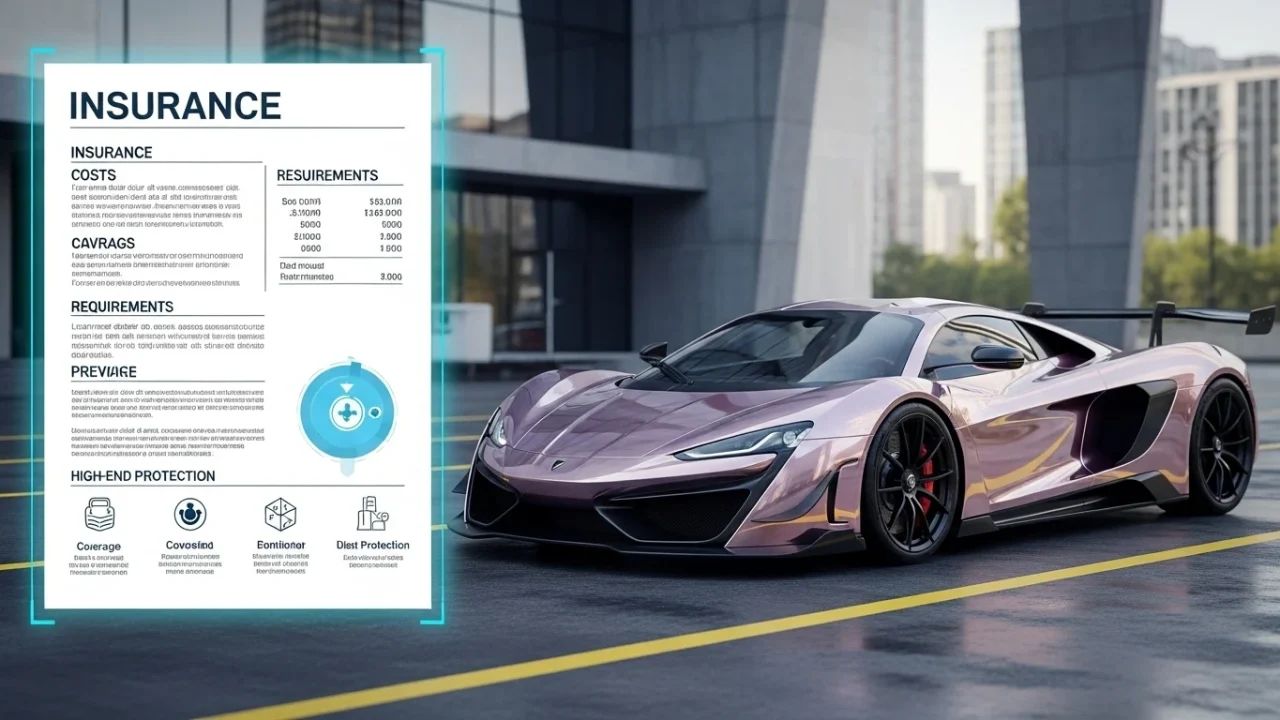Table of Content
When I first started researching hypercar insurance for my client’s McLaren P1, I quickly discovered that insuring a $1.5 million car isn’t like getting coverage for your daily driver.
The world of exotic car insurance operates by completely different rules, with specialized providers, unique requirements, and costs that can shock even seasoned car enthusiasts.
If you’re considering a hypercar purchase or already own one, understanding insurance is crucial. A single accident without proper coverage could cost you everything.
Here’s what I’ve learned from working with hypercar owners and insurance specialists.
Why Regular Insurance Won’t Work
Your everyday auto insurance company will either decline to cover your Bugatti Chiron or offer coverage that’s completely inadequate.
Standard policies use actual cash value, which means they’ll pay market value at the time of loss—often far less than what you paid or what replacement costs.
Hypercars also require specialized repair facilities, original manufacturer parts, and technicians trained specifically on these vehicles. Regular insurers don’t have networks capable of handling these requirements.
Types of Hypercar Insurance Coverage
Agreed Value Coverage
This is the gold standard for hypercar insurance. You and the insurer agree on your car’s value upfront, and that’s what you’ll receive if it’s totaled. For a $2 million Koenigsegg Jesko, you’ll get $2 million—no arguments about depreciation or market fluctuations.
Stated Value Coverage
Less expensive than agreed value, but riskier. You state your car’s value, but the insurer can still dispute it during a claim. They might pay stated value or actual cash value, whichever is lower.
Guaranteed Replacement Cost
The most expensive option, but offers ultimate protection. If your car is totaled, the insurer will replace it with an identical model, regardless of cost increases.
Top Hypercar Insurance Providers
Hagerty Insurance
Best for: Classic and collector hypercars Specialties: Agreed value policies, flexible usage plans Average cost: $8,000-$25,000 annually Unique features: Roadside assistance for exotic cars, automatic coverage increases
Grundy Insurance
Best for: Limited-use hypercars Specialties: No-deductible policies, worldwide coverage Average cost: $6,000-$20,000 annually Unique features: Spare parts coverage, diminished value protection
American Collectors Insurance
Best for: Modern hypercars used regularly Specialties: Higher mileage allowances, track day coverage options Average cost: $10,000-$30,000 annually Unique features: New car replacement, modification coverage
Chubb Insurance
Best for: Ultra-high-net-worth individuals Specialties: Comprehensive lifestyle policies Average cost: $15,000-$50,000 annually Unique features: Worldwide coverage, concierge claims service
Insurance Requirements and Restrictions
Garage Requirements
Most insurers require:
- Enclosed, locked garage storage
- Security system with monitoring
- Climate-controlled environment for cars over $500,000
- Fire suppression system for collections over $2 million
Driver Requirements
- Clean driving record (typically 5+ years)
- Minimum age requirements (usually 25+)
- Sometimes driving course completion
- Annual mileage restrictions (typically 2,500-7,500 miles)
Usage Restrictions
- No daily commuting
- Limited business use
- Track day exclusions (unless specifically covered)
- Geographic limitations in some policies
Cost Factors That Impact Your Premium
Vehicle Value: Obviously the biggest factor. Expect to pay 2-4% of your car’s value annually.
Your Location: Cars in major metropolitan areas cost more to insure due to higher theft and accident rates.
Storage Security: Better security systems can reduce premiums by 10-20%.
Your Driving Record: Any violations or claims significantly impact exotic car insurance rates.
Annual Mileage: Lower mileage equals lower premiums. Many policies offer discounts for under 1,000 miles annually.
Hidden Costs to Consider
Beyond the premium, budget for:
- Appraisal fees ($500-$2,000 annually)
- Security system monitoring ($100-$300 monthly)
- Specialized storage requirements ($200-$1,000 monthly)
- Higher deductibles on comprehensive coverage
Getting the Best Deal
Shop Multiple Specialists: Don’t just call one exotic car insurer. Rates can vary dramatically between providers.
Bundle Policies: Many insurers offer discounts for insuring multiple exotic cars or combining with homeowner’s insurance.
Maintain Perfect Records: Even minor violations can double your premiums.
Document Everything: Keep detailed records of maintenance, modifications, and storage conditions.
Red Flags to Avoid
Avoid insurers who:
- Don’t specialize in exotic cars
- Offer premiums significantly below market rates
- Can’t provide examples of settled hypercar claims
- Don’t require appraisals for high-value vehicles
- Have poor financial ratings from AM Best or similar agencies
Before You Buy
Get insurance quotes before purchasing any hypercar. I’ve seen buyers get shocked by $40,000 annual premiums on cars they thought would cost $15,000 to insure. Factor insurance costs into your total ownership budget from day one.
Some hypercars, particularly limited-production models or those with poor safety records, can be nearly impossible to insure at reasonable rates.
The Bottom Line
Hypercar insurance isn’t cheap, but it’s essential protection for your investment. Expect to spend 2-4% of your car’s value annually on proper coverage. The peace of mind knowing your million-dollar machine is properly protected is worth every penny.
Ready to explore hypercar ownership? Checkout our complete guide and discover if the Koenigsegg Jesko is street legal

